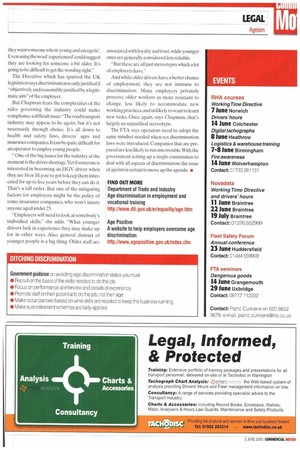Age before beauty
Page 36

Page 37

If you've noticed an error in this article please click here to report it so we can fix it.
From next year employees will be able to seek redress ft they are discriminated against on the grounds of age. Pat Hagan reports.
It's been described as the last form of legal discrimination, but from October next year, refusing somebody a job, promotion or pay rise on the grounds of their age will lay you open to prosecution.
The Government is planning legislation that will clamp down on employers making judgements about potential or existing employees on the grounds of their date of birth, rather than their ability to do the job.
The legislation is driven by an EU Directive, and some employment law experts are already warning that it could lead to a landslide of claims from disgruntled workers. A recent poll of 850 adults by the charity Age Concern revealed one in three believed the problem of age discrimination is worse now than it was five years ago.
But how will the new rules translate into practice in the road transport industry. where — thanks to the importance of drivers' experience —"ageism" is more likely to involve discriminating against younger employees than those of more advanced years?
The exact date when the new rules take effect has not been determined,but the smartmoney's on 1 October 2006.
Details of penalties for non-compliance are similarly obscure — it's not even been made clear if alleged discrimination will be dealt with through EmploymentTribunals or the courts But according to Natalie Ch apman, member services advisor with the Freight Transport Association, operators should already be reviewing their policies and working practices to make sure they do not fall foul of the law: "They should start by looking at their codes ol practice for employment, how they advertise jobs,the kind of wording they use when describing a potential employee.
"One of the big areas will be recruitment advertising. Employers will not he able to say they want someone who is young and energetic'. Even using the word 'experienced' could suggest they are looking for someone a hit older. It's going to be difficult to get the wording right."
The Directive which has spurred the UK legislation says discrimination is only justified if "objectively and reasonably justified by a legitimate aim" of the employer.
But Chapman fears the complexities of the rules governing the industry could make compliance a difficult issue:"The road transport industry may appear to be ageist, hut it's not necessarily through choice. It's all down to health and safety laws, drivers' ages and insurance companies. It can be quite difficult for an operator to employ young people.
One of the big issues for the industry at the moment is the driver shortage.Yet if someone is interested in becoming an HGV driver when they are 16 or 18, you've got to keep them interested for up to live years before they can do it. That's a tall order. But one of the mitigating factors for employers might be the policy of some insurance companies, who won't insure anyone aged under 25.
"Employers will need to look at somebody's individual skills," she adds. "What younger drivers lack in experience they may make up for in other ways. Also, general distrust of younger people is a big thing. Older staff are associated with loyalty and trust. while younger ones are generally considered less reliable.
"But these are all just stereotypes which a lot of employers have."
And while older drivers have a better chance of employment, they are not immune to discrimination. Many employers privately perceive older workers as more resistant to change, less likely to accommodate new working practices, and unlikely to want to learn new tasks. Once again, says Chapman, that's largely an unjustified stereotype.
The FTA says operators need to adopt the same mindset needed when sex discrimination laws were introduced. Companies that are prepared are less likely to run into trouble. With the government setting up a single commission to deal with all aspects of discrimination, the issue of ageism is certain to move up the agenda. •






































































































































































































